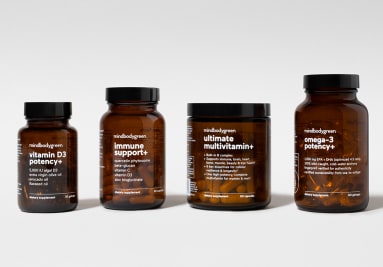To help you strengthen your own body’s natural defenses and begin to build up some immunity armor,* we’ve compiled some of our top advice from experts. Sleep hygiene practices like setting a bedtime, reducing blue light exposure before bed, and creating a soothing nighttime ritual are all valuable ways to promote deep, restorative rest. All that said, it’s important to note that there’s a bit of a catch when it comes to exercise and immunity—chronic rigorous fitness and overtraining can actually be a detriment to your immune system. That’s not to say you can never do a high-intensity workout—just maybe not every single day. Instead, aim for regular moderate-intensity movement that leaves you feeling strong and energized, not absolutely wiped out. Sprinkling in restorative exercise such as yoga, tai chi, and walking can also be great daily practices. Not to mention, these types of movement offer some stress-reducing benefits, too—win, win. Luckily, some simple lifestyle interventions can help decrease stress and increase immune function. For example, one study in the Journal of Alternative and Complementary Medicine suggests that meditation can increase levels of IgA. Other stress-minimizing practices such as journaling, yoga, or even a gratitude practice may be helpful, too—the important thing is to find what works best for you. As a general rule of thumb, it’s smart to wash your hands any time you go to the bathroom, touch something dirty, prepare food, or eat a meal, according to infectious disease specialist Aaron Glatt, M.D. “It’s relatively common sense. If you think you should be washing your hands, you probably should.” (For even more natural habits to support your immune system, check out this comprehensive guide.) For example, Davar advises her clients to eat oysters once or twice a month—due to their high zinc content. “If you’re out at a restaurant and see oysters on the menu, have at least three of them. Consider it medicine; after all, every time you eat, it’s your chance to optimize immunity.” Other wonderful nutrient-rich, immune-supporting foods include: And don’t forget about hydration! Water keeps your mucus membranes lubricated and protected, so viruses, bacteria, and other potentially harmful pathogens can’t latch on to the tissue, Catherine Waldrop, M.D., previously shared with mbg. (For a more comprehensive list, check out this immune-supporting foods guide.) While there are a number of immune-promoting vitamins, minerals, and bioactives out there, these are a few that we’re particularly excited about:* (Read more about this plant-based antioxidant in our quercetin guide.) Conversely, inadequate vitamin C status has been associated7 with lower immune strength and resilience.* And it’s important to note that vitamin C is an essential nutrient, meaning we can’t produce it naturally, so it’s crucial to get through dietary sources. (You can read more about the benefits of vitamin C here.) It’s also worth noting that this important vitamin is best to consume in the D3 form8, which is superior to vitamin D2 in terms of improving and maintaining healthy vitamin D levels in the body.* (Learn more about vitamin D and its benefits.) Like vitamin C, zinc is an essential nutrient and is a very common nutrient gap worldwide.* Most food sources of zinc are found in meat or seafood, which is why Moday notes vegetarians and vegans, in particular, may have a harder time getting enough zinc. This is where a supplement can be helpful.* (Get to know more about the best form of supplemental zinc.) (Discover more about beta-glucans and their benefits.) Beyond the ingredients above, Davar says she’s also a proponent of traditional botanicals like echinacea, elderberry, curcumin, ginger, licorice, and more. “They all create stronger stimuli for our immune cells.”* Both Davar and Moday are fans of medicinal mushrooms (like reishi, chaga, and mitaki), as well.*




